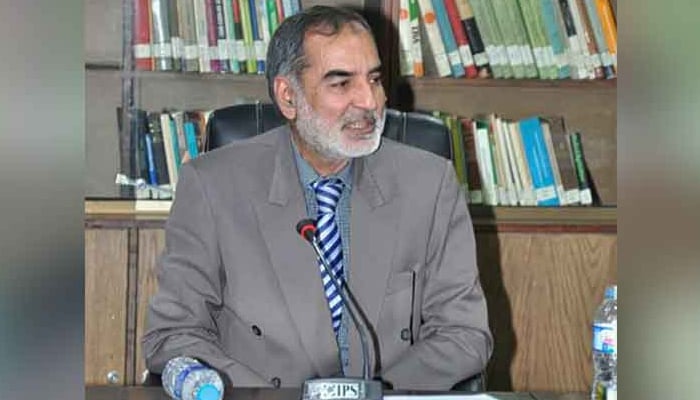Experts call for unified, strategic approach to address blasphemy issue
Islamabad : Experts emphasised during a discussion that the blasphemy issue required a unified, strategic approach as fragmented responses not only undermined internal discourse but increased the country's international vulnerability as well.
They stressed the importance of prioritising sustainable legal and academic efforts, reinforcing the rule of law, and adopting a proactive and diplomatically astute stand globally on the issue.
With Council of Islamic Ideology Chairman Allama Muhammad Raghib Hussain in the chair, the discussion organised by the Institute of Policy Studies centred on the recent Supreme Court review judgement in the Mubarak Sani case and the way forward .
I PS chairman Khalid Rahman noted that the blasphemy issue extended in various dimensions and couldn't be resolved in isolation.
"There is a need f or understanding perspectives of other Muslim countries and recognising the diminishing distinction between local and global contexts,” he said.
Mr Rahman warned assertive approaches could be misinterpreted in the broader goal of honouring Prophet Muhammad (PBUH) and spreading his teachings.
He called for educating people, strengthening legal presence, and diplomatically presenting the Islamic stand on the issue internationally.
Lawyer Imran Shafique insisted that while the Supreme Court removed 'some mistakes'" from its judgement in the case against suspected Qadiani blasphemer Mubarak Sani , several related issues remain unresolved, leading to the current controversy.
He added that the ambiguity surrounding the right to propagate religion in private spaces ha d been a central point of debate.
According to him, there is no mention of public and private spheres in Section 298 -C of the Pakistan Penal Code that stops Qadianis from calling themselves Muslims and preaching or propagating the Islamic faith. Similarly, Articles 20 and 22 of the 1973 Constitution, which guarantees people's religious freedom, d don’t maintain any such distinction.
“ These articles give people religious freedom but with limitations ,” he said.
Mr Shifique said that in order t o rectify the errors in the awaited detailed Supreme Court review judgement on the Mubarak Sani case, paragraphs 5 -10 and 14 of the appeal decision and paragraphs 7 and 42 of the review decision should be removed to be followed by the deletion of paragraphs 13, 15, 20, 21, and 40 from the review verdict.
Legal expert Sajjad Hameed said higher courts ha d dealt with several cases against the Qadiani community’s actions under the constitutional framework, particularly Articles 20 and 22. He noted that in earlier cases, the courts ha d maintain e d the distinction between private and public propagation of faith.
CCI chairman Allama Raghib Hussain emphasised that the current approach to addressing the Qadiani issue w as fragmented, with ulema, lawyers, and scholars working in separate capacities rather than present a collective front , so the case became overly politicised and religiously driven.
“To address these challenges effectively, a shift from emotional responses to more academic and sustainable approaches is necessary, ” he said.
Rafeeq Shinwari , a faculty member of Shifa Tameer-e-Millat University , pointed out that Pakistani law was unclear on several aspects, including the number of witnesses required and the punishments for blasphemy against the Quran and holy prophets. He advocated for comprehensive and consistent legal reforms on blasphemy issue.
Prof Dr Ataullah Mahmood Wattoo of the International Islamic University Islamabad said that t he Constitution's Article 20 guarantee d the right to practice, profess, and propagate religion, but confusion and legal ambiguities persist ed, particularly regarding the status of groups declared non-Muslim s by the British government in 1919 and the 1935 Bahawalpur case.
-
 Reese Witherspoon Sparks Nostalgia With 'Green Sisters' Tribute To Jennifer Aniston
Reese Witherspoon Sparks Nostalgia With 'Green Sisters' Tribute To Jennifer Aniston -
 Royal Family Faces Fresh Crisis While Andrew's Controversy Refuses To Die
Royal Family Faces Fresh Crisis While Andrew's Controversy Refuses To Die -
 Travis Kelce’s Mom Talks About Taylor Swift’s Wedding Dance Song And Whether She’s Signed An NDA
Travis Kelce’s Mom Talks About Taylor Swift’s Wedding Dance Song And Whether She’s Signed An NDA -
 James Van Der Beek's Final Days 'hard To Watch' For Loved Ones
James Van Der Beek's Final Days 'hard To Watch' For Loved Ones -
 Lewis Hamilton Ditched Question About Kim Kardashian?
Lewis Hamilton Ditched Question About Kim Kardashian? -
 Will Smith, Jada Pinkett's Marriage Crumbling Under Harassment Lawsuit: Deets
Will Smith, Jada Pinkett's Marriage Crumbling Under Harassment Lawsuit: Deets -
 'Fake' Sexual Assault Report Lands Kentucky Teen In Court
'Fake' Sexual Assault Report Lands Kentucky Teen In Court -
 'Vikings' Star Shares James Van Der Beek's Birthday Video After His Death
'Vikings' Star Shares James Van Der Beek's Birthday Video After His Death -
 Jennifer Aniston Receives Public Love Note From Jim Curtis On 57th Birthday
Jennifer Aniston Receives Public Love Note From Jim Curtis On 57th Birthday -
 Microsoft AI Chief Says AI Will Replace Most White-collar Jobs Within 18 Months
Microsoft AI Chief Says AI Will Replace Most White-collar Jobs Within 18 Months -
 Late Virginia Giuffre’s Brother Reacts To King Charles’ Promise Against Andrew Mountbatten-Windsor
Late Virginia Giuffre’s Brother Reacts To King Charles’ Promise Against Andrew Mountbatten-Windsor -
 Ex-Arsenal Footballer Thomas Partey Charged With Additional Rape Counts
Ex-Arsenal Footballer Thomas Partey Charged With Additional Rape Counts -
 AI Regulation Battle Heats Up: Anthropic Pledges $20m To Rival OpenAI
AI Regulation Battle Heats Up: Anthropic Pledges $20m To Rival OpenAI -
 Queen Camilla Makes Poignant Visit To Police Stations To Inspect Work
Queen Camilla Makes Poignant Visit To Police Stations To Inspect Work -
 Chloe Kim Set For Historic Halfpipe Gold Showdown At Milano Cortina
Chloe Kim Set For Historic Halfpipe Gold Showdown At Milano Cortina -
 Brooklyn Beckham Gives Cold Response To Cruz's Olive Branch Amid Feud
Brooklyn Beckham Gives Cold Response To Cruz's Olive Branch Amid Feud




